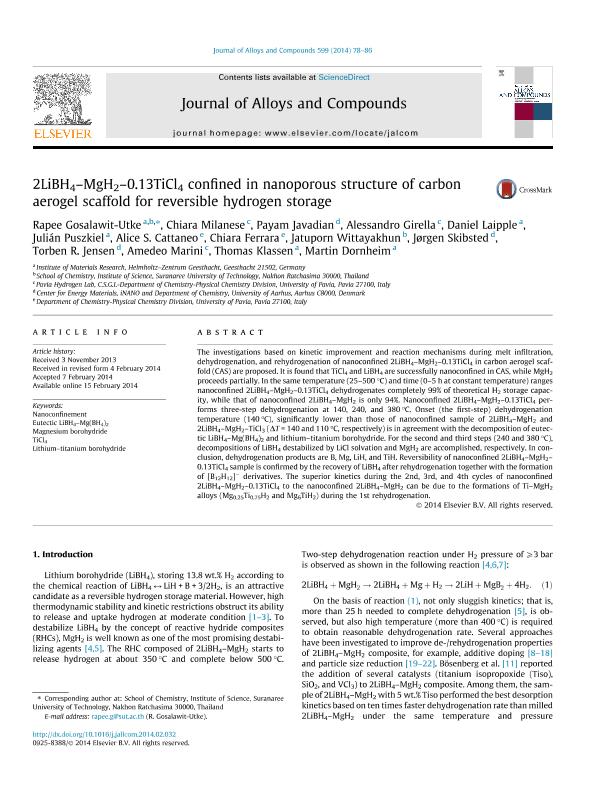Mostrar el registro sencillo del ítem
dc.contributor.author
Gosalawit Utke, Rapee
dc.contributor.author
Milanese, Chiara
dc.contributor.author
Javadian, Payam
dc.contributor.author
Girella, Alessandro
dc.contributor.author
Laipple, Daniel
dc.contributor.author
Puszkiel, Julián Atilio

dc.contributor.author
Cattaneo, Alice S.
dc.contributor.author
Ferrara, Chiara
dc.contributor.author
Wittayakhun, Jatuporn
dc.contributor.author
Skibsted, Jørgen
dc.contributor.author
Jensen, Torben R.
dc.contributor.author
Marini, Amedeo
dc.contributor.author
Klassen, Thomas
dc.contributor.author
Dornheim, Martin
dc.date.available
2017-11-08T14:33:04Z
dc.date.issued
2014-02
dc.identifier.citation
Gosalawit Utke, Rapee; Milanese, Chiara; Javadian, Payam; Girella, Alessandro; Laipple, Daniel; et al.; 2LiBH4–MgH2–0.13TiCl4 confined in nanoporous structure of carbon aerogel scaffold for reversible hydrogen storage; Elsevier Science; Journal of Alloys and Compounds; 599; 2-2014; 78-86
dc.identifier.issn
0925-8388
dc.identifier.uri
http://hdl.handle.net/11336/27811
dc.description.abstract
The investigations based on kinetic improvement and reaction mechanisms during melt infiltration, dehydrogenation, and rehydrogenation of nanoconfined 2LiBH4-MgH2-0.13TiCl4 in carbon aerogel scaffold (CAS) are proposed. It is found that TiCl4 and LiBH4 are successfully nanoconfined in CAS, while MgH2 proceeds partially. In the same temperature (25-500ºC) and time (0?5 h at constant temperature) ranges nanoconfined 2LiBH4-MgH2-0.13TiCl4 dehydrogenates completely 99% of theoretical H2 storage capacity, while that of nanoconfined 2LiBH4?MgH2 is only 94%. Nanoconfined 2LiBH4-MgH2-0.13TiCl4 performs three-step dehydrogenation at 140, 240, and 380ºC. Onset (the first-step) dehydrogenation temperature (140ºC), significantly lower than those of nanoconfined sample of 2LiBH4-MgH2 and 2LiBH4-MgH2-TiCl3 (DT = 140 and 110ºC, respectively) is in agreement with the decomposition of eutectic LiBH4-Mg(BH4)2 and lithium?titanium borohydride. For the second and third steps (240 and 380ºC),<br />decompositions of LiBH4 destabilized by LiCl solvation and MgH2 are accomplished, respectively. In conclusion, dehydrogenation products are B, Mg, LiH, and TiH. Reversibility of nanoconfined 2LiBH4-MgH2-0.13TiCl4 sample is confirmed by the recovery of LiBH4 after rehydrogenation together with the formation of [B12H12] derivatives. The superior kinetics during the 2nd, 3rd, and 4th cycles of nanoconfined<br />2LiBH4-MgH2-0.13TiCl4 to the nanoconfined 2LiBH4-MgH2 can be due to the formations of Ti-MgH2 alloys (Mg0.25Ti0.75H2 and Mg6TiH2) during the 1st rehydrogenation.
dc.format
application/pdf
dc.language.iso
eng
dc.publisher
Elsevier Science

dc.rights
info:eu-repo/semantics/openAccess
dc.rights.uri
https://creativecommons.org/licenses/by-nc-nd/2.5/ar/
dc.subject
Nanoconfinement
dc.subject
Eutectic
dc.subject
Magnesium Borohydride
dc.subject
Lithium - Titanium Borohydride
dc.subject.classification
Nano-materiales

dc.subject.classification
Nanotecnología

dc.subject.classification
INGENIERÍAS Y TECNOLOGÍAS

dc.title
2LiBH4–MgH2–0.13TiCl4 confined in nanoporous structure of carbon aerogel scaffold for reversible hydrogen storage
dc.type
info:eu-repo/semantics/article
dc.type
info:ar-repo/semantics/artículo
dc.type
info:eu-repo/semantics/publishedVersion
dc.date.updated
2017-09-29T16:33:26Z
dc.journal.volume
599
dc.journal.pagination
78-86
dc.journal.pais
Países Bajos

dc.journal.ciudad
Amsterdam
dc.description.fil
Fil: Gosalawit Utke, Rapee. Institute of Materials Research; Alemania. Suranaree University of Technology; Tailandia
dc.description.fil
Fil: Milanese, Chiara. University of Pavia; Italia
dc.description.fil
Fil: Javadian, Payam. University of Aarhus; Dinamarca
dc.description.fil
Fil: Girella, Alessandro. University of Pavia; Italia
dc.description.fil
Fil: Laipple, Daniel. Institute of Materials Research; Alemania
dc.description.fil
Fil: Puszkiel, Julián Atilio. Institute of Materials Research; Alemania. Consejo Nacional de Investigaciones Científicas y Técnicas; Argentina
dc.description.fil
Fil: Cattaneo, Alice S.. University of Aarhus; Dinamarca
dc.description.fil
Fil: Ferrara, Chiara. University of Aarhus; Dinamarca
dc.description.fil
Fil: Wittayakhun, Jatuporn. Suranaree University of Technology; Tailandia
dc.description.fil
Fil: Skibsted, Jørgen. University of Aarhus; Dinamarca
dc.description.fil
Fil: Jensen, Torben R.. University of Aarhus; Dinamarca
dc.description.fil
Fil: Marini, Amedeo. University of Pavia; Italia
dc.description.fil
Fil: Klassen, Thomas. Institute of Materials Research; Alemania
dc.description.fil
Fil: Dornheim, Martin. Institute of Materials Research; Alemania
dc.journal.title
Journal of Alloys and Compounds

dc.relation.alternativeid
info:eu-repo/semantics/altIdentifier/doi/http://dx.doi.org/10.1016/j.jallcom.2014.02.032
dc.relation.alternativeid
info:eu-repo/semantics/altIdentifier/url/http://www.sciencedirect.com/science/article/pii/S0925838814003600?via
Archivos asociados
